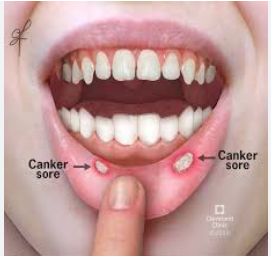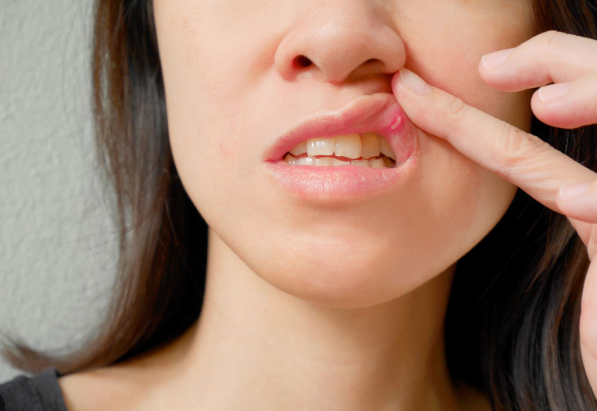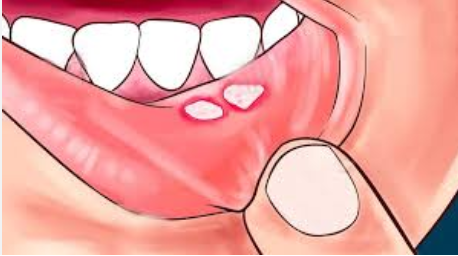Canker sores, also called aphthous ulcers, are small, shallow lesions that develop on the soft tissues in your mouth or at the base of your gums. Unlike cold sores, canker sores don’t occur on the surface of your lips and they aren’t contagious. They can be painful, however, and can make eating and talking difficult.

canker sores causes:
1. Minor injury to the mouth
- Accidentally biting the cheek or tongue
- Braces, sharp teeth, or dental appliances
- Aggressive tooth brushing
2. Nutritional deficiencies
- Lack of iron, folate, vitamin B12, or zinc can increase risk
3. Stress and hormonal changes
- Emotional stress or anxiety
- Hormonal fluctuations, such as during menstruation
4. Food triggers
- Acidic, spicy, or rough foods (like citrus fruits, tomatoes, nuts, or chips)
- Some people react to chocolate, coffee, or certain cheeses
5. Underlying health conditions
- Immune system issues (e.g., autoimmune disorders)
- Gastrointestinal diseases such as celiac disease or Crohn’s disease
6. Allergic reactions
- Certain toothpastes, mouthwashes, or medications containing sodium lauryl sulfate (SLS)
7. Genetics
Family history can make some individuals more prone

Canker Sores symptome:
1. Painful Mouth Ulcers
- Small, round or oval sores inside the mouth
- Usually white, yellow, or gray in the center with a red border
- Most often appear on the inner cheeks, lips, tongue, floor of the mouth, or soft palate
2. Pain and Discomfort
- Painful, especially when eating, drinking, or talking
- Can range from mild irritation to significant discomfort
3. Tingling or Burning Sensation
- Often noticed 1–2 days before the sore appears
4. Swelling and Redness
- Surrounding tissue may be slightly swollen and red
5. Difficulty Eating or Speaking
- Especially with larger ulcers
- Acidic or spicy foods often worsen the pain
6. Recurrence
- Some people get frequent or multiple sores at a time
Less Common Symptoms
- Mild fever
- Swollen lymph nodes (rare)
- Fatigue or general malaise in severe cases

Canker Sores treatment:
1. Home Care
- Avoid irritants: Spicy, acidic, or rough foods; harsh mouthwashes
- Maintain oral hygiene: Use a soft-bristled toothbrush
- Saltwater rinse: Mix 1 tsp salt in 1 cup warm water; rinse several times a day
- Baking soda rinse: Can neutralize acids and reduce irritation
2. Over-the-Counter (OTC) Treatments
- Topical anesthetics: Benzocaine or lidocaine gels to numb pain
- Protective pastes: Form a barrier over the sore (e.g., Orabase)
- Mouth rinses: Antiseptic rinses to reduce secondary infection
3. Prescription Treatments (for severe or recurrent sores)
- Topical corticosteroids: Reduce inflammation and speed healing
- Oral corticosteroids: For very large or multiple ulcers
- Other medications: Sometimes antimicrobial rinses or immune modulators
4. Address Underlying Causes
- Nutritional supplements: Iron, folate, vitamin B12, or zinc if deficient
- Manage stress: Meditation, relaxation techniques, or counseling
- Treat related conditions: Celiac disease, Crohn’s disease, or other autoimmune issues
5. Pain Management
- Over-the-counter pain relievers: Acetaminophen or ibuprofen (if needed)
- Cold foods or ice chips: Can soothe discomfort